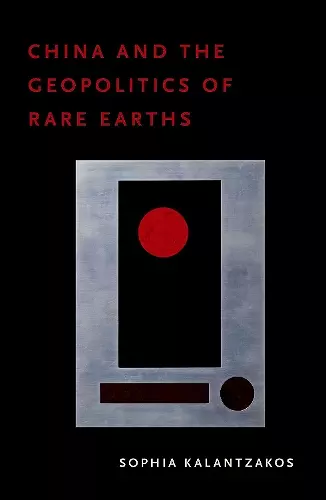China and the Geopolitics of Rare Earths
Format:Paperback
Publisher:Oxford University Press Inc
Published:30th Sep '21
Currently unavailable, and unfortunately no date known when it will be back
This paperback is available in another edition too:
- Hardback£35.49(9780190670931)

Featuring a new foreword that brings the book up to date Rare earths are elements that are found in the Earth's crust, and are vital ingredients for the production of a wide variety of high tech, defense, and green technologies-everything from iPhones and medical technologies to wind turbines, efficiency lighting, smart bombs, and submarines. While they are not particularly "rare" in availability, they are difficult and expensive to mine. Yet, China has managed to gain control over an estimated 97 percent of the rare earth industry since the 1990s through cheap production, high export taxes, and artificial limitations of supply. Rare earths, and China's monopoly over them, became international news after China "unofficially" curtailed exports to Japan, the United States, and Europe in 2010. This embargo followed a collision between Chinese and Japanese boats in the East China Sea, a locus of geopolitical and economic tension between the two countries. Although the World Trade Organization forced China to scrap its restrictions, it still holds a stranglehold over these elements that are so critical to the economic and security interests of the United States and its allies. In this book, Sophia Kalantzakos argues that the 2010 rare earth crisis signaled more than just a trade dispute. Rather, it raises questions about China's use of economic statecraft, and must be regarded as a part of the larger discourse of global power relations. Importantly, she also argues that the failure of political actors in major industrial nations to enact comprehensive and effective policy solutions, or the scientific and business communities to devise sustainable rare earth production outside of China, points to future resource competition. Featuring a new foreword, the paperback edition of China and the Geopolitics of Rare Earths examines the impacts of growing worldwide resource competition and the complexities policymakers face as they develop strategies and responses in an increasingly globalized world.
Kalantzakos has produced a concise and well-written analysis of the role of China in the field of rare earth metals ... While China claims to follow free market principles at home and abroad, this account reveals with great clarity the strategies its government pursues in support of its economic and political interests. The book provides insights into a possible future trajectory of China's continued rise and is vital reading for academics and policy analysts in the field of international political economy. * Philip Andrews-Speed, The China Journal *
Sophia Kalantzakos's China and the Geopolitics of Rare Earths is a book that the broader political science and international relations community has needed ... Concisely and elegantly written, Kalantzakos embeds the specifics of rare earths within broader elements of 'geoeconomics', providing a political economy framework to understand them as another strategic resource ... This book is an engaging read, and fills an important knowledge gap about the rare earth industry for scholars of China and international political economy. It is also accessible for advanced undergraduates and masters students, and would provoke fascinating classroom discussion about emerging technologies, economic statecraft, and the rise of China as a 'geoeconomic' power. * Kristin Vekasi, Journal of Chinese Political Science *
China and the geopolitics of rare earths is an important and timely analysis of China's monopoly on rare earth minerals and the 2010 rare-earth crisis ... While China continues to assert that other countries need to look to alternative sources for rare earth minerals, it has 'carefully orchestrated conditions that ensure its own continued monopoly', an asymmetry that other international actors have been unable to counter. China's policies are therefore a source of rising international tension, which makes the analysis in this book and the lessons drawn from its case-study of increasing international and multisectoral importance. * Miriam Aczel, International Affairs *
[This] book suggests that we have much to learn about international politics and governance—historically and in the current age—via more attention to the rare earth elements that have recently become collectively famous (but that few of us can name individually). * Stacy D. VanDeveer, Global Environmental Politics *
With insight and informed analysis, Kalantzakos demonstrates how the 2010 rare earth metals crisis and China's monopoly of them may be a harbinger of world geopolitics to come. Given the vital role of rare earth metals to modern economies, Kalantzakos' book offers a comprehensively researched and incisively written account of one way the 21st century may be 'China's century'. It challenges conventional understandings of international relations and international political economy, and how we need new thinking to cope with complexity, technological innovation, and the dynamic between competition and cooperation as solutions to resource scarcity. This is an important book offering new ways of thinking about global geopolitics in the decades ahead."-John Barry, Professor of Green Political Economy, Queens University Belfast
China and the Geopolitics of Rare Earths is a groundbreaking study of the newest global conflict over natural resources. Kalantzakos' account is immensely readable, and without any doubt the best study currently available of the political, economic, and environmental challenges of the rare earths crisis."-Christof Mauch, Director of the Rachel Carson Center for Environment and Society, Ludwig-Maximilians-Universität Munich
ISBN: 9780197598740
Dimensions: 234mm x 155mm x 18mm
Weight: 408g
280 pages